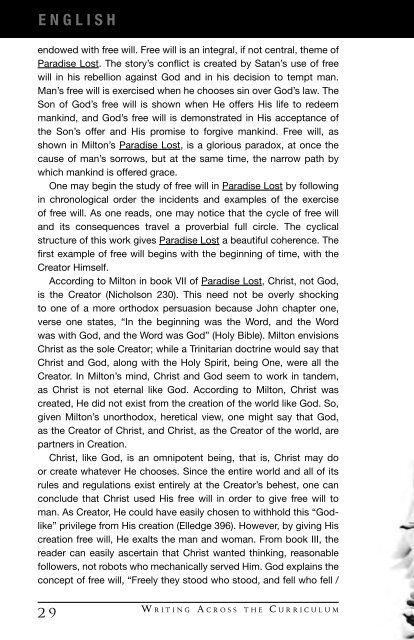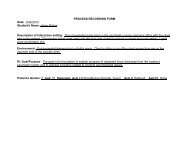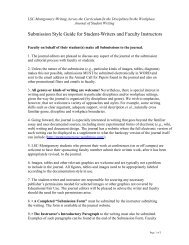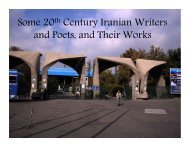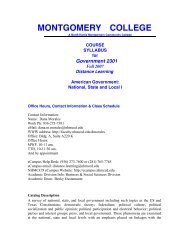2008 - Communication Across the Curriculum (CAC)
2008 - Communication Across the Curriculum (CAC)
2008 - Communication Across the Curriculum (CAC)
Create successful ePaper yourself
Turn your PDF publications into a flip-book with our unique Google optimized e-Paper software.
E n g l i s h<br />
endowed with free will. Free will is an integral, if not central, <strong>the</strong>me of<br />
Paradise Lost. The story’s conflict is created by Satan’s use of free<br />
will in his rebellion against God and in his decision to tempt man.<br />
Man’s free will is exercised when he chooses sin over God’s law. The<br />
Son of God’s free will is shown when He offers His life to redeem<br />
mankind, and God’s free will is demonstrated in His acceptance of<br />
<strong>the</strong> Son’s offer and His promise to forgive mankind. Free will, as<br />
shown in Milton’s Paradise Lost, is a glorious paradox, at once <strong>the</strong><br />
cause of man’s sorrows, but at <strong>the</strong> same time, <strong>the</strong> narrow path by<br />
which mankind is offered grace.<br />
One may begin <strong>the</strong> study of free will in Paradise Lost by following<br />
in chronological order <strong>the</strong> incidents and examples of <strong>the</strong> exercise<br />
of free will. As one reads, one may notice that <strong>the</strong> cycle of free will<br />
and its consequences travel a proverbial full circle. The cyclical<br />
structure of this work gives Paradise Lost a beautiful coherence. The<br />
first example of free will begins with <strong>the</strong> beginning of time, with <strong>the</strong><br />
Creator Himself.<br />
According to Milton in book VII of Paradise Lost, Christ, not God,<br />
is <strong>the</strong> Creator (Nicholson 230). This need not be overly shocking<br />
to one of a more orthodox persuasion because John chapter one,<br />
verse one states, “In <strong>the</strong> beginning was <strong>the</strong> Word, and <strong>the</strong> Word<br />
was with God, and <strong>the</strong> Word was God” (Holy Bible). Milton envisions<br />
Christ as <strong>the</strong> sole Creator; while a Trinitarian doctrine would say that<br />
Christ and God, along with <strong>the</strong> Holy Spirit, being One, were all <strong>the</strong><br />
Creator. In Milton’s mind, Christ and God seem to work in tandem,<br />
as Christ is not eternal like God. According to Milton, Christ was<br />
created, He did not exist from <strong>the</strong> creation of <strong>the</strong> world like God. So,<br />
given Milton’s unorthodox, heretical view, one might say that God,<br />
as <strong>the</strong> Creator of Christ, and Christ, as <strong>the</strong> Creator of <strong>the</strong> world, are<br />
partners in Creation.<br />
Christ, like God, is an omnipotent being, that is, Christ may do<br />
or create whatever He chooses. Since <strong>the</strong> entire world and all of its<br />
rules and regulations exist entirely at <strong>the</strong> Creator’s behest, one can<br />
conclude that Christ used His free will in order to give free will to<br />
man. As Creator, He could have easily chosen to withhold this “Godlike”<br />
privilege from His creation (Elledge 396). However, by giving His<br />
creation free will, He exalts <strong>the</strong> man and woman. From book III, <strong>the</strong><br />
reader can easily ascertain that Christ wanted thinking, reasonable<br />
followers, not robots who mechanically served Him. God explains <strong>the</strong><br />
concept of free will, “Freely <strong>the</strong>y stood who stood, and fell who fell /<br />
2 9<br />
W r i t i n g A c r o s s t h e C u r r i c u l u m


